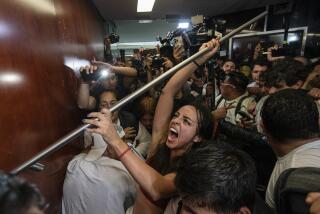Mexico vote-buying scandal threatens president’s agenda of reforms
MEXICO CITY — Mexican President Enrique Peña Nieto on Tuesday faced the most serious political crisis of his young government, an explosive dispute with rival parties over electoral dirty tricks that could imperil his ambitious reform plans.
Peña Nieto’s highly touted Pact for Mexico, a kind of blueprint for his administration’s agenda that had seemed to have won consensus from most major political groups, was on the verge of collapse after fresh reports of vote-buying by the president’s Institutional Revolutionary Party, or PRI.
The government was forced to cancel a series of public events under the auspices of the Pact for Mexico to avoid the embarrassment of a boycott by the main opposition factions.
The first casualty would appear to be a broad reform to overhaul Mexico’s financial sector, which was scheduled to be unveiled Tuesday.
Peña Nieto’s right-hand man, Finance Minister Luis Videgaray, went on early-morning television to assure domestic and international audiences that the financial reform was not dead and would be presented “in a few days.” He also said he was confident that “dialogue” would resume soon.
Other reforms that are working their way through the legislative system or scheduled to be brought up this year — and which need political consensus — include curbing powerful telecommunications monopolies and modernizing oil production. The reforms are all considered essential to Mexico’s prosperity and ability to compete in the global market.
The detonating dispute centers on audio recordings in which PRI elected officials can be heard discussing ways to use a government anti-poverty program to win votes in upcoming local elections.
The recordings involve officials in the coastal state of Veracruz and were made public by the rival National Action Party, or PAN, which held the presidency until Peña Nieto’s election last year.
In one recording, a PRI official says citizens who get aid from the program, including food and stipends, must be immediately registered to vote so they feel obliged to support the party. Another official appears to be conditioning the distribution of government-supplied wheelchairs and dentures to party fealty. In another recording, the officials appear to be discussing ways of purging the social programs of non-PRI participants.
The message, one of the officials says, is “Help us, or else.”
The shenanigans described are a throwback to tactics used throughout the seven decades the PRI held near-absolute power in Mexico. Peña Nieto has insisted that the party, which spent 12 years in opposition until regaining the presidency last year, is changed, having become more democratic and transparent. But the recordings cast doubt on such claims.
Gustavo Madero, national president of PAN, demanded the resignation of Rosario Robles, the Cabinet minister who oversees the poverty programs and whose officials are implicated in some of the recordings. Madero said his party was suspending participation in the Pact for Mexico until Robles, minister for social development, was removed from office.
“We have always said that the PRI wins with payoffs and lies,” Madero said. “We have more evidence every day … that they are using federal [poverty and hunger] programs, structures and resources to promote PRI candidacies.”
Madero said such tactics were being detected in all 14 states where local elections will be held this year. But the most damning evidence is in Veracruz, one of Mexico’s most populous states and one with a long history of corrupt governments. The state has been controlled by the PRI since the party’s founding in 1929.
The boycott by the conservative PAN was seconded by the other major opposition force, the leftist Democratic Revolution Party.
Peña Nieto probably hurt himself by initially minimizing the problem and by publicly backing Robles.
At an enormous gathering in Chiapas recently for the launch of a national anti-hunger crusade, which Robles oversees, Peña Nieto addressed her from the podium. “Don’t worry,” he said.
“You just have to put up with it, because the criticisms have started, the disqualifications from those who are caught up in politics and elections,” he added dismissively.
By Tuesday, he had changed his tune. The president said he would “not tolerate” the use of social programs for electoral ends.
“We are committed to transparency, full accounting and the permanent evaluation of public policies,” Peña Nieto said.
Robles, meanwhile, denied wrongdoing. She said she welcomed a judicial investigation and fired six of the officials running the programs in Veracruz.
More to Read
Sign up for Essential California
The most important California stories and recommendations in your inbox every morning.
You may occasionally receive promotional content from the Los Angeles Times.











